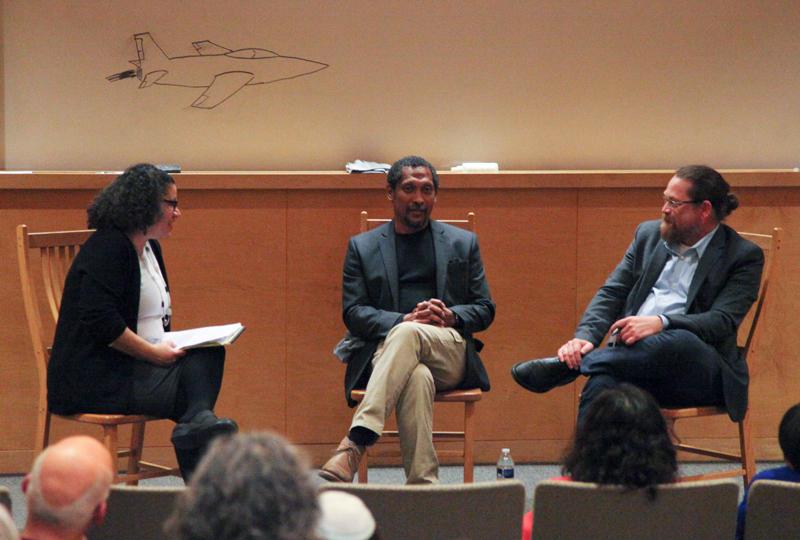Everett Eschews Convention, Laughs at Lit Theory
From left: Associate Professor of English Gillian Johns, writer Percival Everett and Delaney Associate Professor of Creative Writing Dan Chaon discuss Everett’s work and philosophy at a Monday night Q&A with Everett moderatored by Johns and Chaon. Everett, author of over 20 novels, spent two days on campus and also gave a lecture on Ralph Ellison’s Invisible Man the following night.
April 11, 2014
According to Percival Everett, a novel is a little like jazz: “You know it when you see it; you know it when you hear it.” Everett ought to know, as the author of over 20 novels, most recently 2013’s Percival Everett by Virgil Russell. Everett, who is a distinguished professor of English at the University of Southern California, came to campus for a two-day visit. While Everett was often a little hard to follow — intentionally or otherwise — attendees knew when they heard and saw Everett that he was the real deal, if a little eccentric.
Everett was involved in two events open to the public during his brief stay in Oberlin, one on Monday evening and one on Tuesday in Hallock Auditorium. The first event, titled “A Conversation with Percival Everett,” was hosted by Delaney Associate Professor of Creative Writing Dan Chaon and Associate Professor of English Gillian Johns, who also taught a class on Everett’s work during first module in preparation for his visit. Together, the three of them hit the usual salient notes of Everett’s career, including the common allusions to philosophy and literary theory in his work. “Theory is high comedy,” Everett posited, particularly in reference to his 1999 novel Glyph about a genius baby who refuses to speak and reads poststructural theory for fun.
For a writer, Everett was not always particularly keen to explain himself, often giving terse, flippant answers to serious questions posed by Johns and Chaon. Sometimes, though, his answers gave a hint of his ethos. When asked why he writes fiction, he explained, “I want to know what meaning is and how we make it.” Fiction, evidently, is the way in which he chooses to explore it. Not that it always comes easily to him: “I’m not a natural storyteller,” he revealed, which makes one wonder at his prodigious output.
According to Everett, one of the most interesting aspects of fiction is that although “you never forget you’re reading a book,” readers still feel comfortable exclaiming that a character “wouldn’t do that!” To Everett’s view, that response is completely insane — and yet, somehow beautiful. When he is writing a book, he is “God,” and the characters will do precisely what he tells them to — so the fact that readers could become invested enough to criticize an author’s choices is spectacular.
He was also expected to give a reading on Monday night, following the conversation — but he told the audience, as he sat on the stage with one of his books in his hands, “I’m famous for hating readings … because it’s written down!” Instead, he asked, “Would you like me to tell you a story?” When the audience responded enthusiastically, he eschewed the book altogether and started forth with his story, an unexpectedly hilarious misadventure from his early 20s, when he was working on an Idaho ranch.
Everett also gave a brief lecture on Tuesday night titled “Invisible Man and the Clarity of Hell,” concerning Ralph Ellison’s famous 1952 novel. While the lecture was too brief to make any groundbreaking points, several of its smaller insights were canny and fascinating, although the lecture would have benefited from a microphone.
On Monday night, when answering one of Chaon’s questions about why he writes, Everett told a complicated joke that more or less went as follows: A moth goes to the podiatrist’s office and proceeds to unload about his troubles — his wife hates him and his kids won’t talk to him. The confused podiatrist continually reminds the moth that he’s a podiatrist and not able to help. Finally, as the moth persists with his tirade, the podiatrist interjects, “I’m a podiatrist! Why did you come in here?” The moth replies simply, “Because the light was on.” Chaon and the audience were briefly baffled before Everett laughed and explained. The moth, of course, is Everett; he writes fiction because he has to — because the light’s on.


























